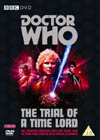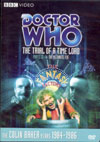DVD Extras include:
Sparking Re-LaunchWe begin once again in the good old courtroom, and immediately get a bit of fresh air as the number of speaking roles here is gradually increased, first with the Keeper of the Matrix. The establishing shot of the space station is delayed until it too can add new information to the mix.Much of the early dialogue displays unnecessary irritability, but intermixed with this, one will find some all time classic sound bites, and more satisfying revelations than anywhere else in the rest of the trial. Glitz is once more a completely enjoyable character, as Tony Selby gives a great performance. Melanie inexplicably gets some of the most artificial dialogue possible. No one introduces themselves with the phrase "known as...", which has been copied from the producer's character brief for the second story in a row now. After satisfyingly exhausting most of the remaining possibilities for the old familiar trial room, the story expands its settings into the Matrix of Gallifrey, which has been at the center of much of the trial's controversy. Apart from a few "phone calls" during "Arc of Infinity" (story no. 124), this is the first time we've gone inside the Matrix for serious story development since it was introduced in "The Deadly Assassin" (story no. 88), and this is a much deserved and long-awaited second outing for it. It remains to be seen if any future story will go there again.... Interesting is the Doctor's choice in selecting Glitz to accompany him instead of Melanie, but who's going to complain as he gets the company of the better of the two characterizations this way. The story is still doing well as the Doctor and Glitz explore the territory inside the Matrix and the way in which the place operates, while the remaining characters in the courtroom try to absorb the meaning and repercussions of all the revelations that recently occurred, trying to sort fact from fiction, and truth from lies.
Round and RoundThe episode does manage to feel padded for about 2 or 3 minutes, once Mr. Popplewick is introduced and it becomes clear that his main purpose is to be a delaying tactic. This feels like textbook Robert Holmes writing here, focusing on richness of character at the expense of plot and pace. In actual fact, perhaps Eric Saward had become too diligent a student of Holmes' style in creating Popplewick. If you are ever going to pad out a script, this is probably the most classic way of making it obvious, by creating a bureaucrat who can bog the protagonists down with filling out forms. It's a classic Holmes theme, raging against the establishment, but it does feel a bit out of place here, after all we've been through and considering what's at stake. Still, it's an easily forgivable interlude.Perhaps we should be thankful that it remained an interlude and was not the main theme of the final episode like Robert Holmes and Eric Saward had planned. Going round in circles for an episode and tying up very little was by no means the healthiest choice for concluding this season, and thankfully John Nathan-Turner realized this. It is too bad though that he didn't realize it at the earlier planning stages, before Holmes and Saward invested themselves so deeply in it. The cliffhanger is effective and bizarre, but a similar effect was done better justice back in "Frontios" (story no. 133).
Although we find out who the Valeyard is, it remains unclear exactly what he is. Apparently he is not quite a proper incarnation of the character we know, and neither does he himself believe he is a complete entity in his current form. The rest is left open to viewer interpretation for now, and we may have to wait until the end of Peter Capaldi's era before we learn anything more....
The Ghost of Christmas FutureAll this seems to feed into Robert Holmes' idea of giving the Doctor a Scrooge-like arc this season and showing him the ghost of Christmas Future, in which case the entire "Trial" scenario might be better revealed as a trick of his own mind. Perhaps he's still lying on Crozier's mind-altering couch as seen in "the present" in Part Five, and the world of the trial represents the struggle his own mind is having to take control of his actions and decisions to put them right. At the very least, a bigger and more obvious pretzel of character logic is required to properly link the ideas pinched from Dickens to the format of this trial.In the absence of a full and proper brief, Part Fourteen writers Pip and Jane Baker pursue their own take on what the Valeyard is, until his creation seems to parallel that of the Mara, which is detailed in "Snakedance" (story no. 125). Equally cool. For sure, both ideas may be interacting to various degrees. Perhaps something similar to what we saw/heard in "The Savages" (story no. 26) helped create the Valeyard, or maybe even Crozier had a hand in creating him after the Doctor left an impression in one of his mind machines. Who knows? In the end, it is all left open, and any future story that attempts to deal with what was started here may just neatly tie the ends up in ways we can't yet imagine. I think I like not having all the answers up front. It invites interesting speculation, and that's what great art is all about. Of course we also have Anthony Ainley's Master, who is a joy to have in the story as usual. In fact, the Master hasn't had a story this good since the Tom Baker era. His motivations are on form, having some truly decent ambitions to work towards. What might usually be considered revenge also functions as a goal that causes him to work to regain what he had before, namely a familiar equilibrium in his endless sparring with the Doctor - something the Valeyard could easily unsettle. All very nice. Additionally, this story sees much action in and around the Master's TARDIS, something which is always enjoyable and has become rarer and rarer during the Master's appearances on the show. "The Ultimate Foe" delivers superbly, featuring THE definitive interior for the Master TARDIS for only the second time in the show's history. Nice. Strangely, we haven't seen as much from the Doctor's TARDIS all season, with most stories ignoring the vehicle as much as possible, and only one or two quick introductory scenes inside it back in episode nine. Weird, but in a way this works since the Trial room took over as the season's base of operations, and was justified in doing so.
Finalizing the FinaleWhatever pseudo-Prime-Directive concerns this trial initially appeared to be about, such concerns are quite noticeably pushed far into the sidelines during these last two episodes, as the cover story is blown and the real motivations of those concerned come out. Perhaps the hypocrisy of the question should get a bit more of a spotlight as the final verdict is given, to help it make a bit better sense. As it stands, the verdict feels a bit rushed and fueled by adrenaline rather than a thoughtful examination of the issues and evidence. Still, it's all in keeping with the character of the show, fueled primarily by the habits of our main protagonist. We should expect nothing less.Not everyone likes the final flip on Peri's fate that was band-aided into this episode. But a companion's final fate can often colour their time spent with the Doctor in hindsight. I don't like watching previously fun adventures, only to think, "This party is like his `Last Supper'", or `She is never going to see so-and-so again'. It feeds into the whole question of whether the Doctor's influence on the people closest to him is beneficial or detrimental in the long-run. So I do think that Peri should live long and prosper. I just don't think she should become Queen to Yrcanos, and I think this is what really spawns most people's objections. "Marriage" exits always seem to be the cheesiest disappointments.
Another complaint is the idea of an important piece of plot hingeing on a "megabyte modem", which is ridiculous for the culture we're in and the size of the story's stakes at that point. But like the more infamous example in "Star Trek 8: First Contact", this embarrassing phrase is just one character's map of the territory, not the territory itself. The line is Melanie's, and remains the first and only on-screen indication in the entire "Trial" season that she is supposed to have a background in computers - perhaps pre-1980's computers at that. What's nice is that, although the Doctor doesn't disagree or correct her which would be ideal, neither does he agree with her, or even truly acknowledge what she says. He's too busy working out what the antagonist is planning. Perhaps he eventually is correcting her when he later has his own, more credible technobabble to spout concerning the gadget. The Doctor gets a decent final fix for the episode, not the greatest thing ever on this show, but something that satisfies healthy action philosophy and has the right emotional energy to it. Although no one knew it at the time, and certainly didn't plan for it in any way including the obvious regeneration scene, this turned out to be Colin Baker's last story. He is exceptionally good in this one, and has a great cast surrounding him here. The story also manages to have a great sequence that builds an atmosphere perfect for any Doctor's finale. Like Patrick Troughton before him, Colin has saved his best story for last, and had many very similar elements in it as well. Musically, I think it was the best choice to bring Dominic Glynn back for these final two episodes, and conclude the season in the same style as it began. Glynn is able to reuse his themes for Glitz and the trial, and comes up with some very nice music for the surreal Matrix that combines nebulous dread with spooky playfulness, nicely nailing the correct tone for the story. Although his work for "The Mysterious Planet" opening segments was a bit more original and striking, this is a close second amongst the season's music.
The entire season has also been better on the whole than Colin's previous one, getting story structure back on its natural form and paying much better attention to the Doctor's actions in each adventure. In fact, season 23 doesn't really have a "dud" story worthy of the Wooden Turkey Award, which is rare for seasons 21 and beyond. In the end, "The Trial of a Time Lord" is one of the imperfect gems of the show, and should become a proud addition to the collection of any serious Doctor Who fan.
International Titles:Deutsch: "Das Urteil 13-14: Der schlimmste Feind"Magyar: "Egy Idő Lord tárgyalása 13-14: A végső ellenség"Français: (Le jugement d'un Seigneur du Temps 13-14: L'ennemi ultime)Русский: "Суд над Повелителем времени 13-14: Совершенный враг"
Rankings for Season 23 - The Trial of a Time Lord:
"The Ultimate Foe" is available on DVD and VHS video as the fourth and final adventure of the Trial of a Time Lord season box set. Click on the Amazon symbol for the location nearest you for pricing and availability:
Comments on this article are welcome. You may contact the author from this page:
|











